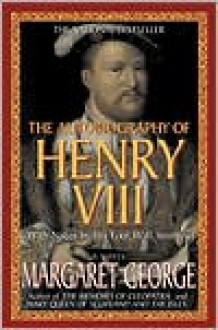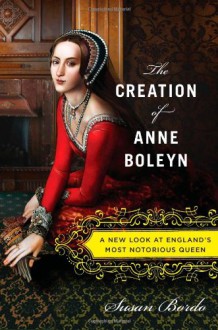
It was so easy to completely immerse myself in the world of Tudor during this exceptionally narrated 42 hour audio. The story is told in first person narrative so it was almost as if Henry himself were telling me his story which had me even more excited about listening to the audio.
The premise is Henry's journals had been smuggled out by his fool Will Somers and are now being sent to Mary Boleyn's daughter, thought to also be the child of King Henry. Throughout, there are little notes from Will Somers which gives further explanation to what is going on in the story. These notes are sometimes just funny or informative anecdotes about the king's actions or personality. Often, Will interrupts Henry's narrative, almost calling him on his posturing and bullshit or self lies, but there is always that underlying respect for Henry even when Will disagrees.
What stands out to me the most about this book is the feeling of authenticity in every aspect of the story, but especially in Henry himself. Margaret George did a phenomenal job bringing Henry to life and giving him a distinctive voice, even though I loathed him throughout the entire story, I still was riveted. I wanted to know what he may have been thinking, his reasoning, his justifications, the possible thought process that led him to some of the most profound political and personal decisions in the history of the monarchy. I was certainly not disappointed.
From his insecurity at the beginning because of his father's doubt about him to the absurd irony of him thinking that Anne Boleyn's greed and love of pomp was not becoming. It was fascinating to see how perceptive he could be about others' flaws but so utterly blind to his own. It was equally fascinating to see how he would allow himself to be manipulated, almost set it up so that he could be manipulated, only so that he would have scapegoats later if and when it all fell through. It made me wonder if Divine Right meant that there never had to be any type of personal accountability for kings. Any action or decision with negative consequences must be laid at the feet of someone else.
While Henry may have started his reign a bit apprehensive because of the doubts his father had expressed, he quickly overcame that initial shakiness. Henry always seemed to act impulsively upon his emotions. For example, Katherine, who was a queens daughter and raised to be a queen, must have thought Henry was insane when he started spouting off to her about love and how her dowry wasn't important. Especially considering that the remainder of her dowry remained a point of contention between Henry VII and Spain causing Katherine to live in near poverty. I've also always thought that, because the crown was so new to the Tudors, and Henry so insecure about his kingship because he was never meant to be king and because his father had so doubted him, that marrying the infanta of Spain gave him a feeling of legitimacy in his right to be king; as though an established monarchy such as Spain recognizes his kingship and gives it some legitimacy; and this is one of the things that, I believe, so attracted him to the match with Katherine.
The Autobiography of Henry VIII did not seem at all sympathetic to Henry as I heard this novel was to be. It showed him to be the arrogant, pompous, insecure, and manipulative man-child that I always believed him to be. He made paper thin excuses for the small petty mean things he did and believed that other people believed his bullshit as much as he convinced himself of it. For example, when Queen Katherine would not agree to the divorce, he began to hate her because she was flaunting what she felt was her "spanish superiority" in his face and she acted like she could ridicule him by pleading for mercy in the court. I read this as his insecurity and that he felt that, as a daughter of Isabella and Ferdinand, and because of her victory in Scotland while he failed in France, that he might actually be inferior to her. And he probably hated her too because she wouldn't just accede to his wishes and let him believe himself innocent and driven by his "conscience" instead she called him on his actions and made him feel accountable, which of course Henry would hate.
While I loved that Henry and Anne's relationship was given such a large portion of the book, I hated the way Anne was shown through Henry's eyes, even though it was absolutely fitting with his personality. It seemed the height of irony for Henry to scoff at Anne for "putting on airs" or acting pretentious, but this also fits in with his nature, that he was unaware of his own flaws and believed that he also had everyone else fooled. I knew I wasn't going to enjoy Anne from Henry's perspective, but I don't know that I was prepared for how utterly repulsive I found his "voice" to be. It was so obvious what he was working up to, what he was trying to convince the reader about Anne, lying to himself and assuming that nobody else saw through him. This was definitely a recurring theme.
Most people used Henry's vanity to manipulate him, they catered to his own wishes and used them to gain favors for themselves. As many found, this was a dangerous game to play. I think Henry would allow himself to be manipulated if it fell in with his own wishes, because he would have then had a ready scapegoat. A great example of this was Wolsey and how brilliantly he inserted himself into Henry's life and made himself almost indispensable from the very beginning. I was fascinated with the way he read Henry's moods, almost anticipating his reactions and acting accordingly to soothe his volatile temper. I think several other people tried this, but few managed to do so as well as Wolsey. Unfortunately, he also accumulated too many enemies and failed to get Henry what he wanted. It was extremely dangerous to work closely with Henry, very few did so and survived.
Throughout this long story, Henry came across as a spoiled, dangerous, delusional, man-child with far too much power and absolutely no logical moral compass. His proclaimed faith in God was even only for those times when he felt God was doing his job correctly, otherwise, Henry had no problem chastising God, even threatening to worship elsewhere. It was hilarious to hear Henry pray and then begin to berate god for his insolence and how God's way of "ruling his subjects" compared unfavorably to Henry's own kingmanship. So even God wasn't exempt from Henry's wrath and blame when things did not go his way. Nothing showed this contempt for God at those times more than the way he clergy was executed and the monasteries desecrated.
I remained completely invested in this story from start to finish and Henry's voice, while often repugnant, felt genuine and from all that I know, the story is historically sound. While some of the story is conjecture as far as the conversations and thoughts, I know that Margaret George spent quite a bit of time researching for this novel so that it would stay as close to factual as possible.
I cannot recommend this enough to anyone who is fascinated with this time period. It is infinitely readable. And don't be intimidated by how long it is, I was never bored even once throughout the entire 42 hour audio. The writing was expressive and engaging and I shared several quotes in my status updates as I was reading. This book will have a permanent home on my favorites shelf and I will also be finding other books by this author, beginning with Elizabeth I.


 Log in with Facebook
Log in with Facebook 









